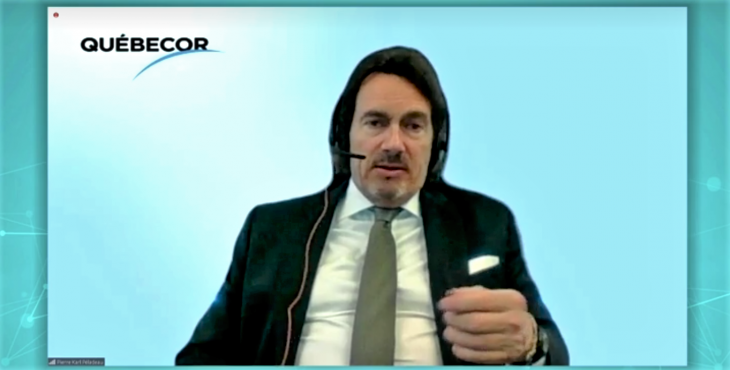
By Denis Carmel
GATINEAU – Québecor CEO Pierre-Karl Péladeau took centre-stage at the CRTC’s hearing into the broadcasting licence renewals for the CBC and reiterated his company’s complaint (which it is advertising here, and in other places) that the public broadcaster must be made complementary to the private broadcasting system, which means the CRTC must put an end to the CBC’s pursuit of advertising.
This is something the Canadian Association of Broadcasters also asked for on Monday.
Péladeau (screen-capped above from his appearance today) also complained over-the-top service Tou.TV Extra is operating in contravention of the regulatory and legislative framework which he believes must ensure free access to all of its on-line platforms. Tou.TV Extra charges a subscription fee, as does Gem in English Canada. Quebecor has complained about this before.
The CEO said he did not believe Canadians, who have already contributed to the CBC through their taxes, should in any way have to pay again whether that’s a subscription fee, or by consuming ads. When asked if he thought the ad and other revenues earned by the corporation goes back to Canadians, he argued when the CBC buys blockbuster foreign films or purchases show franchise concepts abroad, that cash leaves Canada.
He also pointed to what he believes is a radio advertising loophole. While the CBC does not sell ads on CBC Radio, it does sell ads against the radio division’s audio content when it is posted online, in an ad-rich environment.
The pursuit of advertising, said Péladeau, is a “misuse of mandate,” he said in French. Plus, it makes CBC addicted to ratings, leading it “to seek audience at all costs.” Besides, with its billion-dollar-plus Parliamentary appropriation, its participation in the Canadian advertising market is simply unfair, especially in light of the hard times private broadcasters are enduring. “The CBC does not face the same financial reality as the private broadcasters,” he said,
“The future of our television and the diversity of its content requires a balanced ecosystem where every player has a role to play,” he continued in French. “We ask the Commission to ensure that Radio-Canada retakes its true role as a strong public broadcaster so that it can contribute, in a complementary and distinct manner from the private broadcasters, to the cultural expression of Canadians and Quebecers.”
Quebecor started its appearance by asking the CRTC to put additional information on the public record of the proceeding, which began quite some time ago. One is a public opinion poll released in December which says Canadians want a new role for the CBC, and the other was evidence of anti-competitive practices in relation to advertising.
“It makes advertising offers which are completely out of market standards, and it takes advantage of its digital radio service Ohdio to sell advertising on shows that have already been aired on its radio stations which, we reiterate, can not include advertisements,” Péladeau said.
This bit was promptly refuted by the CBC in a short statement Tuesday which said, in French, “The public broadcaster scrupulously respects the laws which govern it and does not engage in any anti-competitive practices. The company will respond to these charges before the CRTC.” The CBC gets to respond to this and other complaints at the final day of the proceeding, January 28.
When it comes to the post-deadline submitted material, as previously stated by the chair at the beginning of the hearing, the Commission said it will rule on the admissibility of new evidence at a later date.



